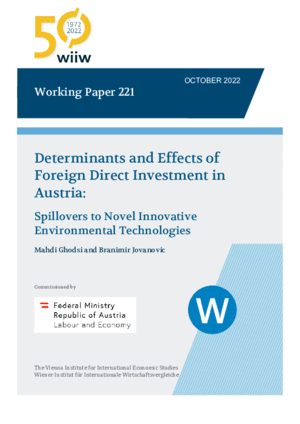Determinants and Effects of Foreign Direct Investment in Austria: Spillovers to Novel Innovative Environmental Technologies
Mahdi Ghodsi and Branimir Jovanović
wiiw Working Paper No. 221, October 2022
77 pages including 29 Tables and 26 Figures
This study investigates the determinants of FDI in Austria, as well as their spillovers to innovating technologies, productivity, and employment, using firm-level data, for the period 2008-2018. The findings point out that a decrease in the costs of trade increases investment in foreign-owned subsidiaries in Austria, and that FDI is pre-dominantly carried out in industries characterised by greater capital-intensity, higher wages, more agglomeration and regional concentration. Furthermore, FDI is higher in regions with a larger GDP and with a larger share of the population with upper secondary and post-secondary non-tertiary education. The study also finds that there are positive spillovers of FDI to the domestic economy, which are strongest and most positive for innovative activities in environmental technologies. In other words, FDI helps Austrian firms to become more innovative in major environmental technologies. Such innovative efforts are best supported at the firm-level by supporting the total assets and investment of domestic firms, and at the regional level by increasing the share of the population with higher levels of education and employing more R&D personnel. The active presence of innovative foreign MNEs that enjoy extensive technological capacities, high-skilled labour, experienced management, and large-scale resources are also conducive to innovative activities.
Keywords: FDI, Austria, spillovers, innovation, environmental technologies
JEL classification: F21, F23, O30, Q55
Countries covered: Austria
Research Areas: International Trade, Competitiveness and FDI
